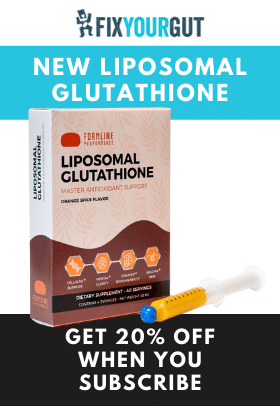Since we have learned the importance of our mitochondria functioning optimally in the last post, then what supplements should be taken daily to facilitate the idea of healthy mitochondria? Quite a few supplements can be taken to help with promoting healthy mitochondrial function including ubiquinol, 1 proper levels of certain minerals (magnesium, zinc, and iron),2 vitamin K2, 3 and R-lipoic acid. 4
Supplements that Promote Optimal Mitochondrial Function
Ubiquinol / CoQ 10
Ubiquinol is a lipid-soluble form of CoQ10 that is found in nearly every cell, tissue, and organ in the human body. 5 Your body produces ubiquinol from the CoQ10 stored in your body or from any CoQ10 you absorb from the food in your diet. 6 Ubiquinol is a potent antioxidant and is capable of regenerating other antioxidants such as vitamin E and vitamin C. 7 The highest concentration of stored ubiquinol in your body is located in your heart! 8 Ubiquinol as a supplement has not been commercially available for a long time. Ubiquinol is not very stable in supplemental form and was difficult to produce. Scientists in Japan found a way to stabilize ubiquinol and have made it available to people all around the world. 9 Ubiquinol is a prescription medication in Japan, but in America it is available freely as a supplement. 10
Ubiquinol’s function in relation to mitochondria is to help generate energy on a cellular level. Ubiquinol is used in great quantities by the mitochondria of our cells. Ubiquinol and CoQ10 are fat soluble and transfer energy as an electron carrier between cells and within the cell organelles as well. 11 Vitamin K2, believe or not, has recently also been discovered to by used by the body as a fat soluble electron carrier, and vitamin K2 also helps increase mitochondrial communication as well. 12
Ubiquinol lowers inflammation, strengthens the heart by providing the heart with more energy to use, and ubiquinol lowers or can help regulate normal blood pressure with relatively no side effects. 13 The only theorized “side effect” (other than the systemic few allergic reactions reported with ubiquinol supplementation, which can happen with any supplement or medication) is that ubiquinol may have a rebound effect if discontinued quickly, if you had been taking the supplement for a while. The rebound side effects are that you might feel tired, weak, and your blood pressure might increase marginally during this period for about a week. Your body synthesizes less CoQ10 and converts less ubiquinol when you are supplementing ubiquinol, so the body can have difficulty producing CoQ10 in the amounts needed to adequately function for a few days if you discontinue the supplement quickly. This difficulty is also known as a rebound effect.
Ubiquinol also can help to restore the gum line in people with gum disease, and supplementation with ubiquinol has been known to reduce or even stop gum bleeding! 14 Anyone over the age of thirty should take a ubiquinol supplement instead of supplementing with CoQ10. The reason is that the body has a harder time converting CoQ10 into ubiquinol after the age of thirty. 15 Organic red palm oil has one of the highest natural concentrations of food sourced CoQ10, 16 followed by the heart organ meats of animals that are high in CoQ10 as well. 17
Ubiquinol and CoQ10 supplements are considered to have very low toxicity and people have taken amounts of 1,200 mg daily for the long term with no side effects. I believe the average person should take 100 mg of ubiquinol daily in the morning for optimal health and energy. 18
Recommended Brands:
- Jarrow Formulas QH-Absorb Ubiquinol,
- Life Extension Super Ubiquinol,
- Pure Encapsulations Ubiquinol-QH
Minerals (Magnesium, Zinc, and Iron)
Magnesium, iron, and zinc are three minerals that are important for optimal functioning of mitochondria. The minerals include magnesium, zinc, and iron. 19 I have written two large posts on the importance of both magnesium and zinc supplementation in everyday health. I will eventually write a post on the importance of maintaining a proper iron blood level as well. For now though, I will briefly go over why each mineral is important to the health of the mitochondria in the body only for the time being.
Magnesium
Magnesium is important to mitochondrial health because it protects the mitochondria from various oxidation reactions. 20 Magnesium is also used in the transfer of ATP. Magnesium helps bond phosphate groups in the production of ATP. 21 Magnesium is used to control the integrity and permeability of the mitochondrial membrane as well. 22 If you are currently suffering from a magnesium deficiency, studies have shown that your cells will have fewer mitochondria currently functioning, and their size will also swell from overexertion. 23 When the mitochondria swell their health is considered poor, like any cell or organ that swells, the swelling creates extra oxidative stress and work that the mitochondria have to perform. Finally, so much magnesium in the body is stored in the mitochondria, that the mitochondria are also known as a magnesium “storage unit” in the body.
Zinc and Iron
If you also have a deficiency in zinc or iron, the deficiency can interfere with the mitochondria’s ability in producing heme. 24 This interference will eventually lead to increased free radical damage in the mitochondria. 25 Heme is used by the body to produce hemoglobin. 26 Hemoglobin is used to transport oxygen in the body and is what gives blood its deep rich red color. Iron is transported into the mitochondria and is converted into heme inside the mitochondria. Proper heme production is important for optimal homeostasis in the human body so that one does not develop the medical condition anemia. Anemia is a condition that stems from a low iron concentration in the blood. Anemia can cause symptoms like fatigue, weakness, shortness of breath, paleness, and malaise. Anemia can be asymptomatic for years in some people but will eventually cause long term complications in the body, like heart problems if left untreated. The most common treatment for anemia is iron supplementation. 27
R-lipoic Acid
Research has shown in the past that R-lipoic acid supplementation reduces oxidative stress and lowers damage from advanced glycation end products in the body. Newer research has recently discovered that R-lipoic acid can protect the body one step further, by preventing and even reversing mitochondrial decay! 28
The mechanisms in which the lipoic acid combats cellular degeneration is by optimizing energy conversion, preventing the release of excess oxidants in the mitochondria that lead to oxidative stress, and by reducing damage done by glycation end products in the cell. It has also been theorized that lipoic acid repairs oxidative damage by enhancing antioxidant defense systems through the activation of phase 2 enzymes. 29
An example of a phase 2 enzyme produced in the body is GSH Transferase. GSH Transferase’s job is to make glutathione bind to xenobiotics (foreign chemicals in the body that you do not produce, most medicines would be an example of a xenobiotic). Glutathione then either detoxifies the xenobiotic or binds to it and eliminates it from the body. 30 Glutathione is known as the “master” antioxidant in the body and one of the ways glutathione is used by the body is to detoxify itself. Lipoic acid supplements also increase the amount of glutathione that is produced in the body as well. 31
Side effects of lipoic acid are odd smelling urine, paresthesia, skin rashes, systemic allergic reaction, and muscle cramps. 32 These side effects are more commonly witnessed when taking the less expensive synthetic alpha lipoic acid instead of R-lipoic acid. 33 Lipoic acid is also a powerful chelator so do not take it at the same time with mineral supplements. If you are mercury toxic, it can cause side effects like tingling, brain fog, and changes in mood. These extra side effects are caused by excess mercury being released and excreted out of the body. 34
Best Brand of R-lipoic acid:
- Gernova R-Plus lipoic acid
Other Recommended Brands:
See more from this series:
- Improve Your Mitochondria Part 1: The Function of Your Mitochondria
- Improve Your Mitochondria Part 2: How to Fix Your Mitochondria With Supplements That Promote Healthy Mitocondrial Function!
- Improve Your Mitochondria Part 3: On L-carnitine
- Improve Your Mitochondria Part 4: More Supplements to Help Increase Energy
- http://lpi.oregonstate.edu/f-w02/coenzymeq10.html ↩
- http://lpi.oregonstate.edu/f-w02/coenzymeq10.html ↩
- http://www.ncbi.nlm.nih.gov/pubmed/18374196 ↩
- http://www.lef.org/magazine/mag2011/aug2011_Lipoic-Acid-Reverses-Mitochondrial-Decay_01.htm ↩
- Balch, Phyllis. Prescription for Nutritional Healing, Avery Publishing, 2010. ↩
- Balch, Phyllis. Prescription for Nutritional Healing, Avery Publishing, 2010. ↩
- http://articles.mercola.com/sites/articles/archive/2012/06/07/dr-robert-barry-on-coq10.aspx ↩
- http://www.lef.org/magazine/mag2008/feb2008_Alleviating-Congestive-Heart-Failure-With-Coenzyme-Q10_01.htm ↩
- Balch, Phyllis. Prescription for Nutritional Healing, Avery Publishing, 2010. ↩
- http://www.lef.org/magazine/mag2007/jan2007_report_coq10_01.htm ↩
- http://www.marksdailyapple.com/managing-your-mitochondria-nutrients-and-supplements/#axzz2hICMvYjy ↩
- http://www.sciencemag.org/content/336/6086/1241 ↩
- http://www.lef.org/magazine/mag2007/jan2007_report_coq10_01.htm ↩
- http://www.lef.org/protocols/dental/gingivitis_05.htm ↩
- http://www.lef.org/magazine/mag2007/jan2007_report_coq10_01.htm ↩
- http://www.coconutresearchcenter.com/hwnl_4-2.htm ↩
- http://www.westonaprice.org/cardiovascular-disease/coenzyme-q10-for-healthy-hearts ↩
- http://www.lef.org/magazine/mag2007/jan2007_report_coq10_01.htm ↩
- http://www.marksdailyapple.com/managing-your-mitochondria-nutrients-and-supplements/#axzz2hICMvYjy ↩
- http://www.ncbi.nlm.nih.gov/pmc/articles/PMC2790427/ ↩
- http://www.ncbi.nlm.nih.gov/pmc/articles/PMC2790427/ ↩
- http://www.ncbi.nlm.nih.gov/pmc/articles/PMC2790427/ ↩
- http://www.ncbi.nlm.nih.gov/pmc/articles/PMC1172515/ ↩
- http://www.marksdailyapple.com/managing-your-mitochondria-nutrients-and-supplements/#axzz2hICMvYjy ↩
- http://www.marksdailyapple.com/managing-your-mitochondria-nutrients-and-supplements/#axzz2hICMvYjy ↩
- Beers, Mark, The Merck Manual, Merck Research Laboratories, 2006 ↩
- Beers, Mark, The Merck Manual, Merck Research Laboratories, 2006 ↩
- http://www.lef.org/magazine/mag2011/aug2011_Lipoic-Acid-Reverses-Mitochondrial-Decay_01.htm ↩
- http://www.lef.org/magazine/mag2011/aug2011_Lipoic-Acid-Reverses-Mitochondrial-Decay_01.htm ↩
- Beers, Mark, The Merck Manual, Merck Research Laboratories, 2006 ↩
- Balch, Phyllis. Prescription for Nutritional Healing, Avery Publishing, 2010. ↩
- http://lpi.oregonstate.edu/infocenter/othernuts/la/ ↩
- http://www.lef.org/magazine/mag2005/feb2005_report_lipoic_01.htm ↩
- http://www.thorne.com/altmedrev/.fulltext/7/6/456.pdf ↩







How long should the time between taking any mineral supplements such as magnesium, iron, calcium, zinc etc. and R-lipoic acid be so that R-lipoic acid will not chelate these minerals and make them useless for you?
Can I take peanut butter astaxanthin, coq10, and alpha lipoic acid together and get good absorption?
John,
You mentioned in the rebound effect when stopping ubiquinol suddenly, and I read in another article of yours that you suggested taking it for 3 weeks on and 1 week off because the body synthesizes less ubiquinol when supplementing it. Is this effect mainly for ubiquinol? Does your body also synthesize less r-lipoic acid when you supplement it?
Just curious because I don’t remember you mentioning the rebound effect or cycling on and off for other supplements such as r-lipoic acid.
There is a possibility that there would be a rebound effect with lipoic acid and glutathione, there is just less anecdotal evidence associated with them.
Thank you for writing such a clear and understandable explanation of mitochondria, John. It is very much appreciated!
This is very attention-grabbing, You are an excessively professional blogger.
I’ve joined your rss feed and look forward to in the hunt for more of
your excellent post. Also, I’ve shared your web site in my social networks
I have a yeast sensitivity so I avoid any supplements created through fermentation with yeast. Although that is the most popular way to produce CoQ10, it appears there are two other ways:
“Ubidecarenone is manufactured by organic synthesis, yeast (non-Saccharomyces cerevisiae) fermentation, or bacteria fermentation.”
http://www.ncbi.nlm.nih.gov/pubmed/19652461
Do you know of any source produced using organic synthesis, and do you have any comment on that?
Looks like this company uses a new (2006) fermentation-free synthesis http://www.pharmaessentia.com/chinese/products_2_2.html
http://www.nutraingredients.com/Industry/Expansions-and-new-suppliers-ease-CoQ10-bottleneck
But I can’t find a brand to buy from
It really depends on how sensitive to yeast you truly are. There should be very little yeast byproducts in a finished supplement because it is highly refined.
I’m very sensitive
Brandon e-mail me at [email protected] or Pm me on the Bulletproof forums, lets discuss up-regulation of aldehyde detox pathways if you do not mind.